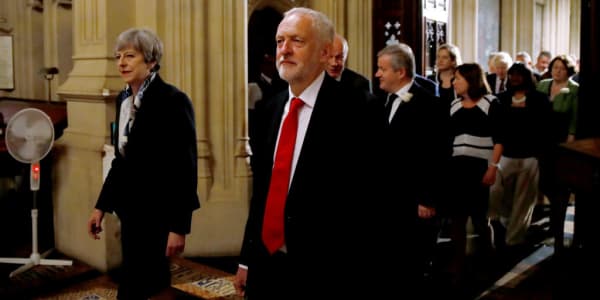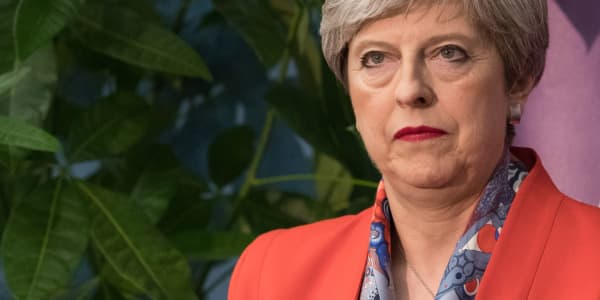British Prime Minister Theresa May has "largely agreed" a support deal with Northern Ireland's Democratic Unionist Party (DUP) which will enable her to prop up her Conservative government, according to BBC reports.
May held talks with DUP members of parliament Tuesday afternoon to discuss a "confidence and supply deal" which will provide her with the backing needed to form a parliamentary majority.
The talks follow an inconclusive election outcome on Friday in which May's party secured an underwhelming 318 seats, eight short of a parliamentary majority. A deal with the DUP's 10-seat party will provide the backing required for a 326 majority.
Unidentified sources told the BBC Tuesday that there are "no outstanding issues" to be discussed following the two-hour talks and a deal will likely be struck by Thursday.
Meanwhile, a senior Conservative source later told Reuters that the talks were "ongoing" but refused to confirm a timescale.
May, who is due to meet with French President Emmanuel Macron in Paris later on Tuesday afternoon, refused to speak to reporters as she left the talks at 10 Downing Street. A Conservative representative is expected to continue talks with the DUP during her absence.
DUP leader Arlene Foster, who left separately, took to Twitter shortly afterwards to say that discussions were "going well."
"Discussions are going well with the government and we hope soon to be able to bring this work to a successful conclusion," Foster said on Twitter,
A 'dubious' deal
While talks were ongoing, former Conservative Prime Minister John Major told BBC Radio 4's World at One that he was "wary" and "dubious" about the proposed Tory-DUP deal.
Major said he feared the pact could undermine the fragile Northern Ireland peace process, which he was instrumental in brokering in its early days.
"My main concern is the peace process," he said.
"A fundamental part of that peace process is that the UK government needs to be impartial between all the competing interests in Northern Ireland. And the danger is that however much any government tries, they will not be seen to be impartial if they are locked into a parliamentary deal at Westminster with one of the Northern Ireland parties."
He also called on May's government to consult more with other parties ahead of upcoming Brexit talks, which are due to start on June 19 but, like the Queen's speech, could face delays amid the ongoing political upheaval in the U.K.
May is expected to have to agreed concessions in exchange for the DUP's support in no-confidence and government-financing votes, which are essential to keeping a minority government in power. However, Major, as with many other critics of the deal, argued that other devolved governments in the U.K. would be angered by a promise of extra funding for Northern Ireland.





